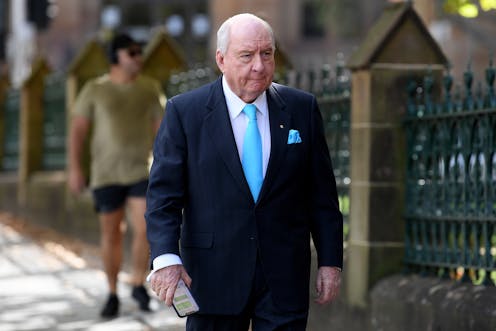The last squawk? Alan Jones finally seems to have nowhere to go
- Written by Denis Muller, Senior Research Fellow, Centre for Advancing Journalism, The University of Melbourne

So the Parrot, as H. G. Nelson called him, has been pushed off his perch, Sky News having refused to renew his contract.
Over 36 years, Alan Jones became one of the most powerful, divisive and socially destructive voices the Australian media has ever produced.
At the same time, in rating terms, he became a phenomenon. In April 2020, he achieved his 226th ratings win[1] in the Sydney breakfast time slot, a performance that has never been equalled and probably never will be.
It was an accomplishment built on three foundations. He was articulate in the red-blooded language of conservative outrage that his listeners felt but could not put into words. He had an unerring instinct for the issues that would inflame them, and he persuaded them that he was their champion in the corridors of power.
His broadcasting career began in 1985 when he joined Radio 2UE in Sydney as its mornings host. He moved to the breakfast shift in 1988 and soon took it to number one.
In 2001, he moved from 2UE to 2GB, taking a large slice of his audience with him and making that station number one in the Sydney breakfast market, a position it has recently regained after slipping briefly[2] when Jones left in May 2020. For a long time, he was politically untouchable.
In 1999, he was caught up in what became known as the cash-for-comment scandal[3]. His evidence to the ensuing Australian Broadcasting Authority inquiry was dismissed by the counsel assisting, Julian Burnside, QC, as defying belief.
Read more: The times suited him, then passed him by: the Alan Jones radio era comes to an end[4]
In 2000, the inquiry made adverse findings against him[5].
Politically, he remained untouched. Within a few weeks, he was hosting an event for John Howard, who was then prime minister, and in 2001, he was dining with the Labor premier of New South Wales, Bob Carr, to discuss government policy.
The following week, Carr dispatched his police minister-designate, Michael Costa, to Jones’ home to discuss law-and-order policy.
For his part, Howard used Jones’ program to reach that audience segment known as “Howard’s battlers”, occupants of what Jones called Struggle Street, of which Sydney’s western suburbs have a plentiful number and where Jones rated strongly.
To the extent he was able to put the issues of this audience directly to the likes of Howard and Carr, Jones was indeed a voice for the otherwise voiceless in the corridors of power. Whether this had any effect on voting intentions is another question.
Author and social researcher Rebecca Huntley has written that after 15 years of research, she had not found Jones to be any more influential with voters than ABC Radio or The Sydney Morning Herald. She concluded:
For a long time at 2GB, he was commercially untouchable, too.
In 2005, he was found[6] by the Australian Communications and Media Authority to have breached the radio code of practice by inciting violence against people of Middle Eastern ethnicity in a series of incendiary broadcasts leading up to the race riots at Cronulla Beach that year.
The ACMA characteristically decided it was sufficient to enter into a “dialogue” with 2GB.
In 2012, he said Julia Gillard, who was then prime minister, should be put in a chaff bag, taken out to sea and dumped. At about the same time, he made a speech to the Sydney University Liberal Club in which he said Gillard’s recently deceased father had “died of shame” at the lies her daughter told.
In the aftermath of this, social media pressure on big advertisers such as Harvey Norman, Big W and Mercedes-Benz was so intense that Jones’ employer, Macquarie Radio, suspended all advertising on the show to take the pressure off them.
In 2019, Jones told Scott Morrison, who had by then become known as the “2GB prime minister”, to shove a sock down the throat of New Zealand’s prime minister, Jacinda Ardern. Jones was outraged Ardern had said Australia would have to answer to the nations of the Pacific on climate change.
This time, advertisers boycotted the Jones show in droves, costing 2GB an estimated 50%[7] of the show’s revenue.
Macquarie Radio was getting sick of him. In addition to these advertising losses, in 2018, he had cost the network $3.75 million in a defamation action[8] brought against it by four brothers whom Jones had wrongly accused of causing the deaths of people in Grantham, near Toowoomba, during the Queensland floods of 2011.
In May 2020, he retired from 2GB, but was snapped up Sky News amid great fanfare for a personal nightly spot at 8pm.
His ratings were poor. He routinely came fourth behind other Sky-at-Night luminaries such as Andrew Bolt, Paul Murray and Peta Credlin.
The COVID-19 disinformation he routinely spread on the program was a factor in Sky’s being suspended by YouTube[9] for seven days in early August.
Shortly before that, Sydney’s Daily Telegraph had dropped his column, which he had also used to spread COVID disinformation.
Whatever his talents, and however impressive his record, he has been a canker on Australian democracy.
Finally he seems to have run out of platforms, not because of the harm he has done to the social fabric but because he is no longer rating well and bringing in big advertising dollars.
That is the way it was always going to end.
References
- ^ 226th ratings win (www.dailytelegraph.com.au)
- ^ slipping briefly (www.mediaweek.com.au)
- ^ cash-for-comment scandal (www.theguardian.com)
- ^ The times suited him, then passed him by: the Alan Jones radio era comes to an end (theconversation.com)
- ^ findings against him (catalogue.nla.gov.au)
- ^ he was found (www.smh.com.au)
- ^ an estimated 50% (www.theguardian.com)
- ^ a defamation action (www.abc.net.au)
- ^ suspended by YouTube (www.theguardian.com)
Read more https://theconversation.com/the-last-squawk-alan-jones-finally-seems-to-have-nowhere-to-go-171212

















